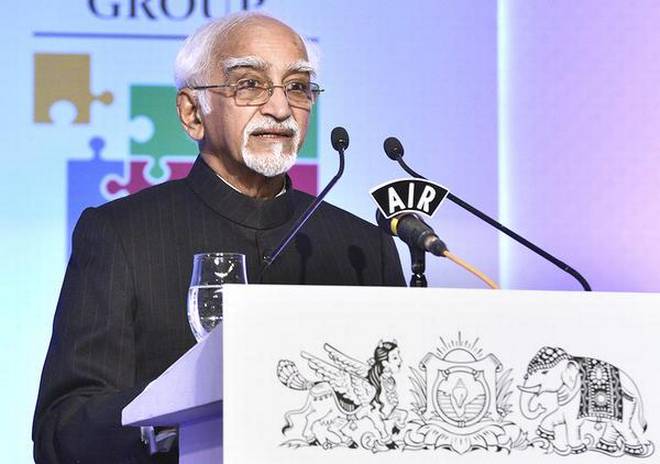Kolkata, WEST BENGAL / NEW DELHI :

Gap between rich and poor is not narrowing, he says at The Huddle
Vice-President Hamid Ansari on Friday called attention to the increasing economic inequality worldwide, particularly in India with all its social and political consequences, and noted that protest movements globally are being fuelled by public despair.
Delivering the inaugural address, titled ‘Living in Febrile Times’, at The Huddle, a three-day conclave of ideas, he said, “We need to ask ourselves some uncomfortable questions. Can we just accept the growing insularity, intolerance and discrimination?”
Noting that the gap between the rich and poor shows no sign of narrowing, Mr. Ansari suggested that the situation demands impatience with business-as-usual development policies. “Perhaps the time has come,” he said, “to move the development discourse beyond the current discussion of outcomes and opportunities. A conceptual framework is provided by Amartya Sen and others who see human capabilities as the capacity and freedom to choose and to act; and calls for opportunities that give individuals the freedom to pursue a life of their own choosing to be equalised.” He linked such a compact back to the Preamble to the Constitution and cited the World Economic Forum’s Global Risk Report of 2017 to frame the dangers of failing to bridge income inequality: the rise of populism. In India, he pointed out, the richest 1% have claim to 60% of the country’s wealth, and the bottom 50% to 2%. “Rising inequality is seen as a contributing cause for the rise of authoritarian leaders, often with a divisive agenda fuelled by sectarianism, xenophobia and nationalism,” he said.
Rising inequality results in conflict, and threatens the stability of democracies. Surveying protests worldwide such as the Occupy Movement and the Arab Spring, he highlighted the Naxalite issue: “The growing threat of left extremism, which has been repeatedly acknowledged as the gravest security threat to [the] Indian state, has its roots in economic deprivation and inequality in access to resources.”
Calling for equity in development, Mr. Ansari cautioned against writing off inequity as an “inconvenient truth” in the quest for a “shining future”. He counselled a rethink on the trickle down model of growth, and cost-benefit analysis of the environmental impact of “our material progress” – as well as an appraisal of India’s investment in human capital and public goods.
Equity is integral to justice and fairness, he said, and went on to ask the ‘uncomfortable question’: “Are conflicts and human suffering the new normal? To what extent are they induced by failed ventures in [the] quest for unrealisable utopias?”
Earlier having made a passing reference to the age of “post-truths” and “alternate facts”, Mr. Ansari’s was in total a plea to see the complete picture: not just the rising incomes of many, but also the rising inequality in wealth and income; not just the number of people lifted out of abject poverty, but also “the majority of people on the planet today… in countries where economic disparities are bigger than they were a generation ago.”
source: http://www.thehindu.com / The Hindu / Home> News> National / by Special Correspondent / February 11th, 2017








